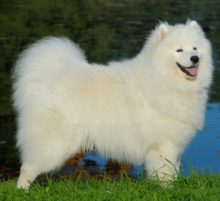Samoyed
Lifestyle Needs

The Samoyed is a Spitz type breed previously used for herding and guarding livestock. He is a large dog with a prodigious coat which needs a great deal of specialised grooming. For this reason he is not a suitable dog for a busy family. He is high spirited, needs to handled firmly and can be rather vocal. Ideally he needs to live in a house with a garden and be given plenty of exercise.
Genetic Diversity
(Known as Coefficient of Inbreeding: 'COI'. It should be as low as possible.)
The UK Kennel Club breed average COI is 8.5% - See 'A Beginners Guide to COI'
Gene Pool Size
(Known as Effective Population Size: 'EPS')
64.7
EPS is a measure of how many individuals are contributing genetically to a breed population. It is a measure of the size of the gene pool in a breed. Lower than 100 is considered critical by conservationists and below 50 brings a breed close to extinction. For more information see the Kennel Club article.
Health and Welfare Problems due to Conformation
(Body shape and physical characteristics)
- The thick, bushy coat of the Samoyed is intended to keep him warm in an arctic climate, so he will have a tendency to overheat in warm weather. He will suffer if not provided with cool places to rest. His coat will also cause welfare problems if it is not kept scrupulously groomed.
- Medial canthal pocket syndrome (upper and lower lids on the inside corner of the eye roll inwards creating a ‘pocket’ in which irritating substances, such as dirt and dust, can collect – due to head shape)
BVA/KC Health Schemes: www.bva.co.uk/chs
- Hip dysplasia: breed 5 year mean score 12.5 (parents should be lower)
- Elbow dysplasia: score should be as low as possible
- Eye disease: Progressive retinal atrophy (PRA) (annual testing); Multifocal retinal dysplasia (MRD) (litter testing)
Estimated Breeding Values (EBVs) : EBVs for Hip Dysplasia are available for this breed
www.thekennelclub.org.uk/about-ebvs
DNA Tests Available
DogWellNet and IPFD Harmonisation of Genetic Testing for Dogs (HGTD)
www.dogwellnet.com/breeds
- Amelogenesis Imperfecta
Availability of a DNA test does not mean that it is always necessary or even desirable for breeders to use this test.
Other Breed-Specific Health Screening Schemes
Breeders should give grooming advice.
Ask the breeder to show you the certificates for the above tests/screening for both parents. If any of the above tests have not been considered necessary by the breeder (and there may be good reasons), ask her to explain why.
Other Diseases Reported
(For which there are currently no genetic or screening tests for sire or dam)
- Diabetes
- Cancer: Squamous cell carcinoma
- Indolent Ulcers (eyes)
- Cataract
- Glaucoma
- Deafness (breeders should carry out BAER testing)
Ask the breeder about the medical history of the parents, grandparents and great grandparents. Consider carefully whether to purchase a puppy if some of these or other diseases are in the family line.
Ask about the breeder’s policy in cases of serious genetic diseases occurring to your puppy in later life. Good breeders will request to be informed of such events in order to improve future breeding decisions.
You are strongly advised to buy from a breeder who uses (or is prepared to use) the AWF Puppy Contract and Puppy Information Pack (PIP): www.puppycontract.org.uk
The breeder should also be familiar with the CFSG/DBRG Code of Practice for Dog Breeding